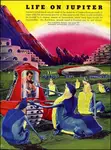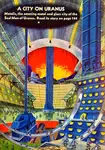- Home
- Your Views
- Part six of The Archives of the Moon
Part six of The Archives of the Moon
by Robert Gibson
(Lancashire, England)
VI
Chill was the reaction of Royden to the sight of the living among the dead, though he did not know why – he ought to have felt relief, even at the sight of that prosaic, unimaginative man with whom he had had prior dealings at various scientific conferences and whom he had (if truth be told) somewhat despised.
A furtive revulsion delayed Royden’s response as Dawcott approached to offer his hand in greeting. The suspicion appeared to be mutual as the half-dazed Administrator scrutinised Royden’s visor.
“I am glad to see you,” the official spoke tremulously, his voice thin and squeaky in the rarefied atmosphere of the Selenite city. “Yes,” he continued, “I am certainly glad to see someone. Who actually are you, though? I thought I was the last man alive here,” he added, wonderingly.
“You don’t remember me? We’ve met before. My name is Royden. I have just come from Frontier Base, to investigate the truth here.”
There was a macabre emptiness about the meeting. A coldness grew inside Royden as he wondered how long Dawcott could have remained unhelmeted and alive. If the plague theory was no longer to be believed, then perhaps Dawcott had committed the killings himself? If so, it would not be the first such case of lunacy...
However, Dawcott’s next words constituted a reciprocal plea for knowledge. “Can you tell me anything about this pestilence? Why am I the sole survivor of my team? In the last work period all have succumbed... all except I myself... if only I could understand...”
Royden did not, could not answer. He stared down at the row of dead men. At the sight of their fierce, parched faces, which looked to have been consumed by some unfathomed power, the idea that old Dawcott could have been responsible became absurd.
The prostrate corpses lay sprawled upon the examples of Selenic script, which the men must have extracted from the primordial library. Royden began to feel that he understood – in vague, immense outline – where the stupendous truth must lie.
Each lunarian slab, inscribed with the varying dots and dashes in blazing vermillion, seemed somehow to possess its own distinct personality. That was easy to say in a superficial artistic sense, but for Royden the meaning ran deeper. He quickly reached the fantastic and unwelcome conclusion, that the researchers who now lay dead in front of him, in their attempt to study these arcana, had suffered from some deadly signification. They could hardly have deciphered the script by their own efforts; yet by unknown super-sciental means the linguistic bequest of remote aeons had acquired an animate liberty, had loosed from the bonds of its medium and –
What am I saying? wondered Royden, indignant and frightened at the direction his thoughts had taken.
He faced it: somehow his intuition was telling him that the pure meaning of those Selenite records had burst into terrestrial brains, had blasted and shrivelled the men who received it.
Terror gripped Royden as he wondered: does this intuition of mine mean that the process has started upon me, too?
The wizened corpses wore variously exaggerated expressions of infinite ecstacy, curiosity, or nether horror. Corresponding no doubt to the texts which they have read, he thought numbly.
Royden knelt in hypnotic fascination, no longer capable of the slightest doubt that the script could be read. Not deciphered – read. Directly. In its own terms. It carried its meaning within it... the patterns were the meaning.
For he had approached within the zone of comprehension; it was arrogating his whole attention to itself; and it could and would make him read, read the ultimate symbols which were as far beyond English in communicative power as English was beyond the grunts of wild things.
So he was in for it, he would have to read one of the texts; but which was it to be? Currently, he was aware that on hands and knees he was crawling close to the most atrocious visage among the corpses – the face of one who had been unlucky enough to drift into the clutches of a rampantly nightmare message. Royden strove to shake himself away from this particular pull of meaning. A threat of understanding seemed about to draw him past a point of no return; dimly he was simultaneously aware that Dawcott was shouting at him, demanding to know why he was crawling over the slabs.
Royden was no longer free to answer, and in any case could not have spared the attention to do so. He had but one idea: to avoid sharing the perdition that had entered via the eye-sockets of the reader of the message which now had him, too, in its “signifying” pull.
A spasm of weakened muscles wrenched Royden aside, into the less fiendish lane of attraction of an adjacent slab. It then proceeded to draw him forward as the other had done –
The influence of a script too potent for the mind of man was obscuring his sense of personal identity, so that over him there now stole a mood of languid resignation, to a fate which promised to be more interesting than any other kind of death.
He had no strength left to shift lanes once again. Perforce he abandoned the hope that he might enter the blissful and Edenic saga promised by the text to the left of the one which now held his mind on a contracting leash. Well, he’d have to be satisfied with the enigmatic one that held him. As it reached to engulf him finally, at least he was no longer terrified.
What seemed to Royden to be a palpable, plasmic emanation – but which was invisible to Dawcott who stood watching in uncomprehending dismay – now issued from the inscribed slab to embrace the captive reader utterly.
Royden experienced an intoxicating revelation, which had the force of an ineffable dream, as he seemed to perceive the very dots and lines starting out from the stones and flaunting their meanings with inevitable certainty, for this language of the Selenites had gone beyond the representational, had bypassed all need of metaphor or ideograph, and appeared on the deepest level of suggestion as stark Truth.
Benignant and all-powerful seemed the text to its human receptacle, when the latter’s struggles had ceased. Around his head the noetic reverberations hummed a deific nocturne, galvanizing his awareness beyond human ken, until the super-words formed vortices, which widened into a kaleidoscopic whirl to coalesce ultimately into one vivid view.
It was a scene near the western shore of the ocean called Zpibaraz, near the Opkaz Mountains, when the moon was young.
Comments for Part six of The Archives of the Moon
|
||
|
||









































